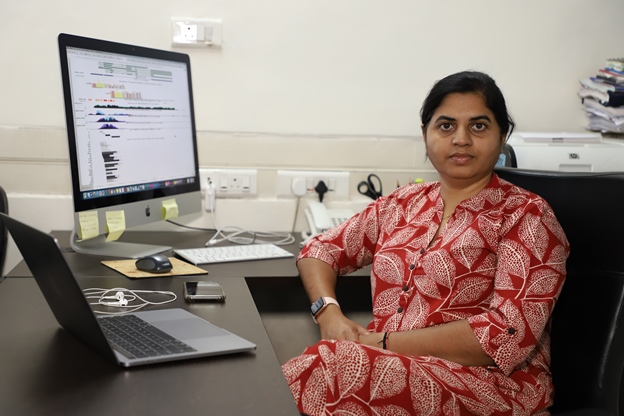
Vidisha Tripathi, Ph.D.
tvidisha@nccs.res.in
Research Areas
Genome Architecture and Regulation, Regulatory RNAs and Gene Expression
Education and Experience
Scientist-D [Jan 2015 - present]: National Centre for Cell Sciences, Pune, India
Postdoctoral Research Associate [March 2009-Dec 2014]: University of Illinois at Urbana-Champaign, Illinois, USA
PhD [March 2003- Feb 2009]: Banaras Hindu University, Varanasi, India.
M.Sc. [2002]: VBS Purvanchal University, Jaunpur, India
Research
The central dogma of molecular biology dictates that the genome is transcribed into RNA, which in turn encodes proteins that execute most structural, catalytic and regulatory functions in cells. However, recent whole genome transcriptome analyses have revealed a large subset of RNAs that execute various structural or regulatory functions without being translated into proteins. These RNAs are referred as non-coding RNAs (ncRNAs). Regulatory ncRNAs can be broadly classified into small (18-200nt) and long ncRNAs (lncRNAs; >200nt). The human genome encodes ~ 15,000-17,000 potential lncRNAs. However, the function of less than 2% of these is clearly elucidated. Several lncRNAs exhibit temporal and spatial expression patterns or their expression is restricted to particular tissue or cell types or cell cycle stages, indicating vital and diverse biological roles of lncRNAs. The major focus of my laboratory is to explore how mammalian long noncoding RNAs define or drive cell fate decisions, and to develop a mechanistic understanding of how mammalian lncRNAs regulate events associated with oncogenesis.
Publications
Tripathi V, Shen Z, Chakraborty A, Giri S, Freier SM, Bennett CM, Becker K, Gorospe M, Prasanth SG, Lal A and Prasanth KV(2013). Long Noncoding RNA MALAT1 Controls Cell Cycle Progression by Regulating the Expression of an Oncogenic Transcription Factor Mybl2. PLoS Genetics. Mar;9(3):e1003368 (PMID: 23555285).
Tripathi V, Song DY, Zong X, Shevtsov SP, Hearn S, Fu X-D, Dundr M and Prasanth KV (2012). SRSF1 regulates the assembly of pre-mRNA processing factors in nuclear speckles. Mol. Biol. Cell . 23(18):3694-706. (PMID:22855529).
Tripathi V, Ellis JD, Shen Z, Song DY, Pan Q, Watt AT, Freier SM, Bennett CF, Sharma A, Bubulya PA, Blencowe BJ, Prasanth SG and Prasanth KV (2010) The Nuclear-Retained Noncoding RNA MALAT1 Regulates Alternative Splicing by Modulating SR Splicing Factor Phosphorylation. Molecular Cell 39 (6): 925-938.
For complete list of publications, click at:
https://scholar.google.co.in/citations?user
Funding
Our laboratory is funded by Department of Biotechnology, India. Vidisha Tripathi is a DBT Ramalingaswamy Fellow.
Opportunities
Postdoctoral position
Highly motivated scientists interested in non-coding RNA world with strong background in cell biology, biochemistry and/or molecular biology methods are always encouraged to apply. Inquire by email to : tvidisha@nccs.res.in
Ph.D positions:
Prospective graduate students interested in our research (RNA Biology/Cell and Developmental biology) should apply through our regular Ph.D. program at NCCS and contact Vidisha Tripathi for possibilities of research projects.
12 months training:
Students interested in MS/M.Sc project training projects, please email at tvidisha@nccs.res.in or academics@nccs.res.in
Back
Last updated On : 23 June 2022 10:12


